May 30, 2025 | 11:37 GMT +7
May 30, 2025 | 11:37 GMT +7
Hotline: 0913.378.918
May 30, 2025 | 11:37 GMT +7
Hotline: 0913.378.918
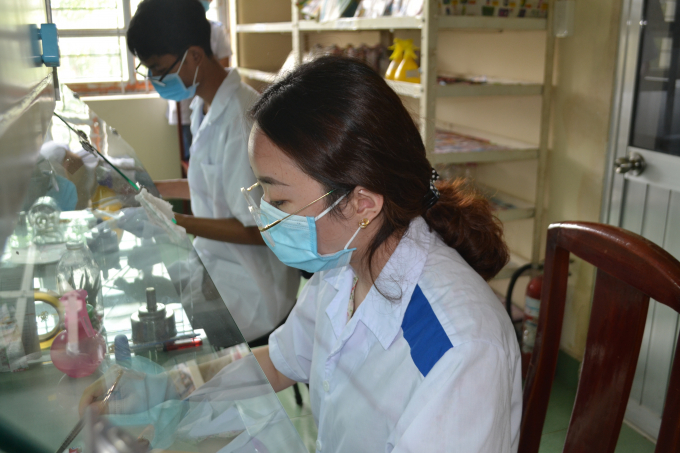
Students of the Department of Agronomy (Nong Lam University - HCMC) at the laboratory. Photo: Tran Trung.
Being one of the leading universities that train human resources for agriculture, from a very early period Nong Lam University - Ho Chi Minh City has implemented the model of "Startup University in Training, Innovation and Creation”, having the Center for Technology Business Incubation as the core.
According to Dr. Do Xuan Hong, Director of Center for Technology Business Incubation, the startup university is where students learn theoretical and practice innovation startups, establish and organize the development of a startup business.
The Center for Technology Business Incubation was founded in 2010. Its operation involves recruiting, supporting organizations and individuals to develop and commercialize all scientific research products, and incubating potential businesses.
At the same time, the center aims to build a dynamic community which includes students, alumni and lecturers in many fields, thereby establishing an effective network to connect students and researchers with businesses and investors.
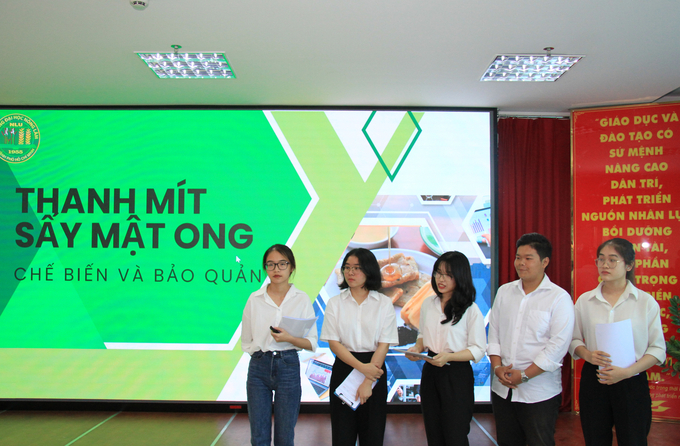
Students of Nong Lam University - HCMC presenting their startup ideas at the competition. Photo: Tran Trung.
The Center for Technology Business Incubation has recently held the fifth "Agricultural Startup" competition. With the theme "Breakthrough and creativity for smart agriculture", the competition attracts more than 100 projects. Participating in the competition, students brought many creative startup ideas with commercial potential.
One of the memorable projects is the purslane tea products of two students, Nguyen Thi Van Anh and Nguyen Ngoc Yen Nhi, from the Department of Bio-Sciences. Once offered to taste the purslane salad, the inspiration came and the two young students soon immersed themselves in studying products related to purslane in Vietnam.
According to the project team, purslane has the ability to well inhibit enzymes related to diabetes. During the research process, the team used sublimation drying technology to create purslane tea products. Patients can use this product every day, thereby supporting a more varied diet instead of being too abstinent.
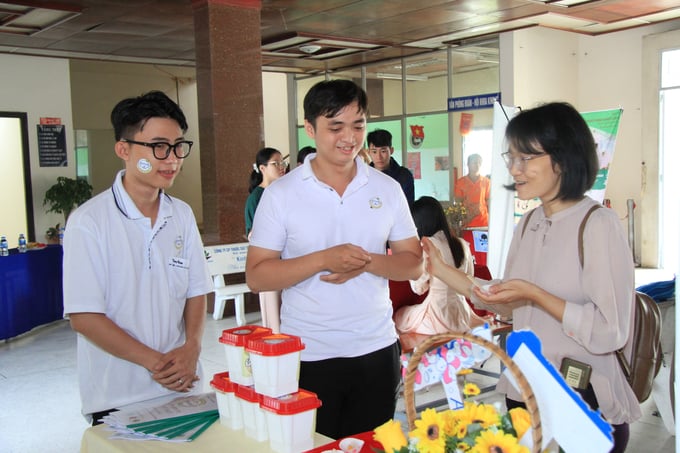
Students of Nong Lam University - HCMC presenting the products - the fruit of their research. Photo: Tran Trung.
After 5 years of organization, the competition has attracted 307 projects, with nearly 1,200 students coming to present their best ideas and products. The projects all show the spirit of innovation, application of scientific and technical advances to solve practical problems of life, especially problems concerning agriculture, countrysides and farmers.
Through the competition, students are not only trained in business knowledge but also equipped with technology knowledge and experience from businesses. They are also given the opportunity to meet and discuss with businesses and investors to gain more opportunities to realize their business projects.
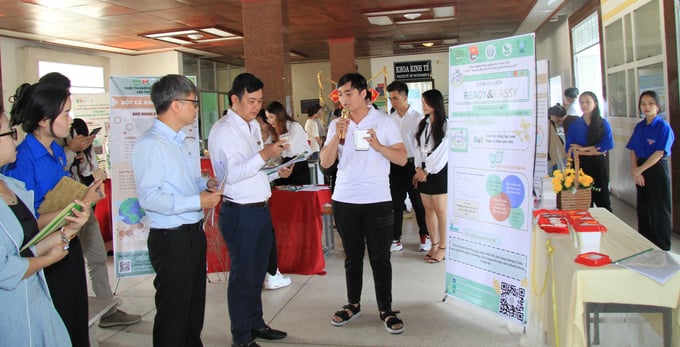
Businesses look to the "Agricultural Startup" competition in search of high-quality human resources. Photo: Tran Trung.
Do Xuan Hong said that, in Vietnam, the story of building a startup university model can be approached from the third-generation university model. It helps universities fulfill their mission to directly create an impact on society through innovation and the transfer of science and technology. In order to perform well the "third mission", universities need to build a model operating with a series of systematic activities, capable of leading research activities towards commercialization.
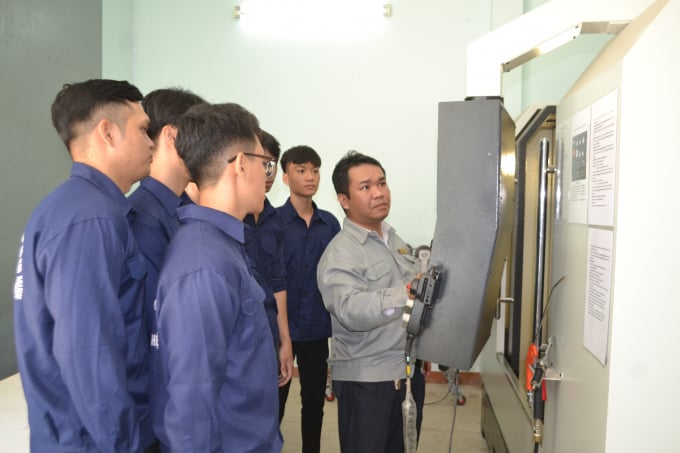
Student at Nong Lam University - HCMC during class time. Photo: Tran Trung.
In order to build a startup university model, universities need to clearly define the fundamental principles to make a difference from the traditional university model. The fundamental feature of the startup university model is the high research level of specialized faculties, laboratories, institutes and research centers.
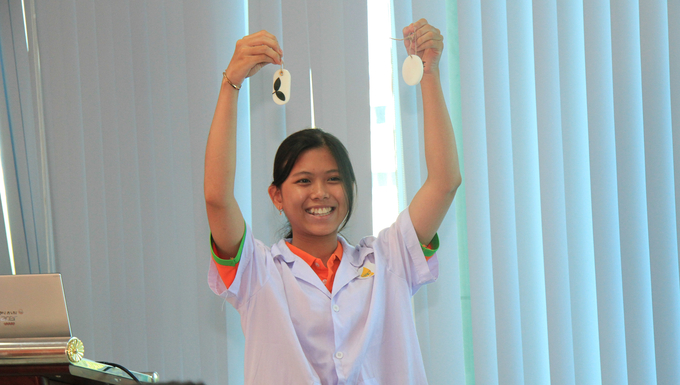
Students excitedly show off their research results, which are the keychains produced from agricultural by-products. Photo: Tran Trung.
These are the main "factories" that create inventions, technological solutions, as well as business models and ideas based on scientific and technological products. The commercialization of inventions and inventions will be supported and promoted by technology transfer offices or technology business incubators.
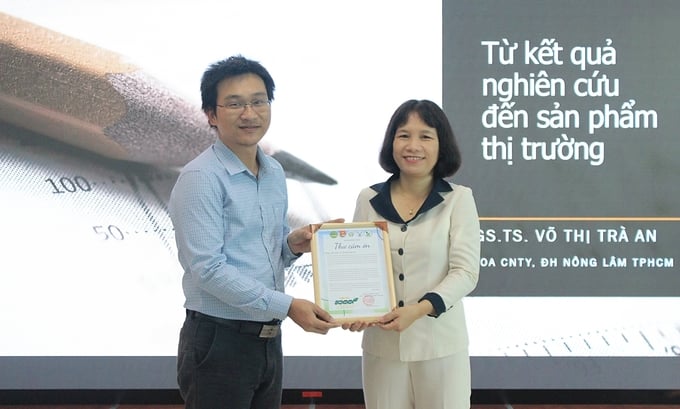
Dr. Do Xuan Hong expresses his gratitude towards businesses accompanying the Center. Photo: Tran Trung.
During their operation, startup universities will receive support, cooperation and funding from the business sector to fulfill their mission of commercializing scientific and technological products. At the same time, startup universities receive support policies from the government and state management agencies.
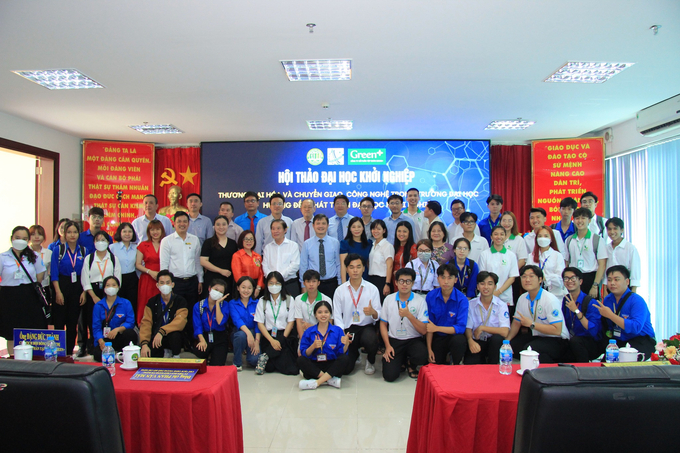
Humanity - service - innovation - integration is the core value of Nong Lam University - HCMC in human resource training. Photo: Tran Trung.
“With the mission of building a multi-disciplinary university, with the core being branches of agriculture and forestry, economics, management, science and technology, Nong Lam University constantly improves the quality of training and connects with businesses so that graduates can work at their best, thus meeting the requirements of employers.
“In the future, Nong Lam University - HCMC will renew the systems of management, administration, and human resources, promote the spirit of creativity and entrepreneurship, making full use of talents and resources; build a system of modern material and technological foundations to meet the demand of training and scientific research. We aim to build and develop into a university with quality training, research, technology transfer and international cooperation, on par with advanced universities in the region and the world,” said Dr. Tran Dinh Ly, Vice Rector of Nong Lam University - HCMC.
Translated by Samuel Pham
/2025/05/25/4127-3-073637_820.jpg)
(VAN) Thanks to the promotion from an FAO-implemented project, vegetable production in greenhouses in Moc Chau has seen strong development, from 1.5 hectares in 2021 to nearly 50 hectares in 2024.

(VAN) FAO has recently supported USD 140,000 to implement the project 'Risk mitigation human-animal interface risks through disease control initiatives in pig farming.'

(VAN) The People's Committee of Tra Vinh province has approved an adjustment to the investment policy for the Green Hydrogen Plant project, increasing its area to approximately 52.76 hectares.
![Reducing emissions from rice fields: [2] Farmers’ commitment to the soil](https://t.ex-cdn.com/nongnghiepmoitruong.vn/608w/files/news/2025/05/05/dsc08881jpg-nongnghiep-140632.jpg)
(VAN) Clean rice cultivation model in Thuong Tan commune, Bac Tan Uyen district, is assisting local residents in achieving sustainable agriculture by substantially reducing costs, increasing productivity, and protecting the environment.

(VAN) At the conference to disseminate Resolution No. 68, AgriS introduced its digital agricultural ecosystem and reaffirmed its commitment to accompanying the Government in promoting private sector development and sustainable agriculture.

(VAN) 'Blue Ocean - Blue Foods' initiative is designed to restore marine ecosystems and establish sustainable livelihoods for local communities by cultivating a minimum of 1,000 hectares of cottonii seaweed in the first three years.
/2025/05/21/4642-3-112707_603.jpg)
(VAN) The V-SCOPE project has made direct contributions to three out of six pillars of the Comprehensive Strategic Partnership between Vietnam and Australia.